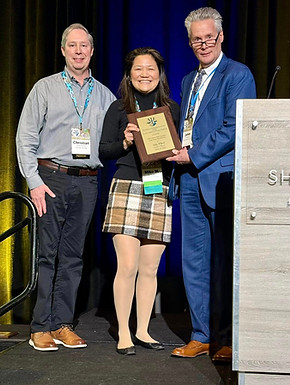P.L.E.A. LAB

RESEARCH
Selected publications from the P.L.E.A. Lab and its collaborators
LAW AND HUMAN BEHAVIOR
Wilford, M. M., Frazier, A., Lowe, A., Newsome, P., & Strong, H. V. (2025). Quick and dirty: An evaluation of plea colloquy validity in the virtual courtroom. Law and Human Behavior, 49(3), 311–322. https://doi.org/10.1037/lhb0000619
JOURNAL OF EXPERIMENTAL CRIMINOLOGY
Yan, S., Wilford, M. M., & Ferreira, P. A. (2025). The effect of probation length and detailed disclosure on true and false guilty pleas. https://doi.org/10.1007/s11292-022-09543-9 XXXXXXXX
PSYCHOLOGY, CRIME AND LAW
Redlich, A. D., Wilford, M. M., DiPano, M.,& Berger, N. (in press). Commonalities in false guilty plea cases. https://doi.org/10.1080/1068316X.2023.2213381
THE WRONGFUL CONVICTION LAW REVIEW
Wilford, M. M., Gonzales, J. E., & Khairalla, A. (accepted). When pleas precede evidence: Using Bayesian analyses to establish the importance of a reasonable standard for evidence prior to plea offers.
JOURNAL OF EXPERIMENTAL CRIMINOLOGY
DiFava, R. J., Bettens, T., Wilford, M. M., & Redlich, A. D. (2024). Confession evidence results in more true and false guilty pleas than eyewitness evidence. Journal of Experimental Criminology, 20, 1253-1267. https://doi.org/10.1007/s11292-023-09577-7
PSYCHOLOGY, CRIME AND LAW
Wilford, M. M., & Bornstein, B. H. (2023). The disappearing trial: How social scientists can help save the jury from extinction. Psychology, Crime and Law, 29(1), 1-24. https://doi.org/10.1080/1068316X.2021.1984482
CRIMINAL JUSTICE AND BEHAVIOR
Henderson, K. S., Sutherland, K. T., Wilford, M. M. (2023). “Reject the offer”: The asymmetric impact of defense attorneys’ plea recommendations. https://doi.org/10.1177/00938548231172515
PSYCHOLOGY, CRIME AND LAW
Wilford, M. M., & Bornstein, B. H. (2023). The disappearing trial: How social scientists can help save the jury from extinction. https://doi.org/10.1080/1068316X.2021.1984482
LAW AND HUMAN BEHAVIOR
Wilford, M. M., Sutherland, K. T., Gonzales, J. E., & Rabinovich, M. (2021). Guilt status influences plea outcomes beyond the shadow-of-the-trial in an interactive simulation of legal procedures. Law and Human Behavior, 45(4), 271-286. https://doi.org/10.1037/lhb0000450
JOURNAL OF EXPERIMENTAL PSYCHOLOGY: APPLIED
Wilford, M. M., Zimmerman, D., Yan, S., & Sutherland, K. T. (2021). Innocence in the shadow of COVID-19: Plea decision making during a pandemic. https://doi.org/10.1002/acp.3724
LAW AND HUMAN BEHAVIOR
Wilford, M. M., Sutherland, K. T., Gonzales, J. E., & Rabinovich, M. (2021). Guilt status influences plea outcomes beyond the shadow-of-the-trial in an interactive simulation of legal procedures. https://doi.org/10.1037/lhb0000450
AMERICAN JOURNAL OF CRIMINAL JUSTICE
Wilford, M. M., Wells, G. L., & Frazier, A. (2021). Plea-bargaining law: The impact of innocence, trial penalty, and conviction probability on plea outcomes. https://www.doi.org/10.1007/s12103-020-09564-y
JOURNAL OF EXPERIMENTAL PSYCHOLOGY: APPLIED
Wilford, M. M., Zimmerman, D., Yan, S., & Sutherland, K. T. (2021). Innocence in the shadow of COVID-19: Plea decision making during a pandemic [Psychological Factors in Responding to COVID-19 Special Issue]. Journal of Experimental Psychology: Applied, 27(4), 739-750. https://doi.org/10.1002/acp.3724
AMERICAN JOURNAL OF CRIMINAL JUSTICE
Wilford, M. M., Wells, G. L., & Frazier, A. (2021). Plea-bargaining law: The impact of innocence, trial penalty, and conviction probability on plea outcomes. American Journal of Criminal Justice, 46(3), 554-575. https://www.doi.org/10.1007/s12103-020-09564-y
APPLIED COGNITIVE PSYCHOLOGY
Wilford, M. M., Kurpad, N., Platt, M.* & Weinstein-Jones, Y. (2020). Lecturer fluency can impact students' judgments of learning and actual learning performance. Applied Cognitive Psychology, 34(6), 1444-1456. https://doi.org/10.1002/acp.3724
LAW AND HUMAN BEHAVIOR
Smith, A. M., Wilford, M. M., Wells, G. L., & Quigley-McBride, A. (2019). Mistaken eyewitness identification rates increase when either witnessing or testing conditions get worse. https://doi.org/10.1037/lhb0000334
PSYCHOLOGY, PUBLIC POLICY, AND LAW
Wilford, M. M., & Redlich, A. D. (2018). Deciphering the guilty plea: Where research can inform policy. https://doi.org/10.1037/law0000169
PSYCHOLOGY, PUBLIC POLICY AND LAW
Wilford, M. M., & Wells, G. L. (2018). Bluffed by the dealer: Distinguishing false pleas from false confessions. https://doi.org/10.1037/law0000165
PSYCHOLOGY, CRIME AND LAW
Wilford, M. M., Van Horn, M. C., Penrod, S. D., & Greathouse, S. M. (2018). Not separate but equal? The impact of multiple-defendant trials on juror decision-making. https://www.doi.org/10.1080/1068316X.2017.1351969
Awards and Honors
Recent awards and honors given to Dr. Miko Wilford and to members within the P.L.E.A. Lab

Recognition
American Psychology-Law Society (American Psychological Association, Division 41) Saleem Shah Early Career Award
Named Division 41 American Psychological Association Fellow
Recent publication was named the “Editor’s Choice” for the June issue of Law and Human Behavior: “Quick and dirty: An evaluation of plea colloquy validity in the virtual courtroom”

Dr. Miko Wilford being awarded the Saleem Shah Early Career Award
Student Conference Presentations
AP-LS:
Keely Allain
Allain, K. M., Kruisselbrink, E., Wilford, M. M., Fitzgerald, R. J., & Anderson, P. (2026). From Feeds to IDs: The contaminating effect of social media compared to mugbooks. Accepted as a paper presentation for the annual conference of the American Psychology-Law Society, Reno, NV.
2024 AP-LS Student Travel Award
Patricia Ferreira
Ferreira, P. A., Wilford, M. M., & Yan, S. Mandatory guilty pleas? The effect of relief from mandatory minimum sentences on guilty pleas. Paper accepted at the 2026 American Psychology-Law Society annual conference, Reno, Nevada.
Yan, S., Ferreira, P. A., & Wilford, M. M. Terms and conditions apply: The effect of probation details and duration on true and false guilty pleas. In M. M. Wilford (Chair), Using an interactive simulation of legal procedures to study plea decision-making. Paper presented at the 2022 American Psychology-Law Society annual
conference, Denver, CO.